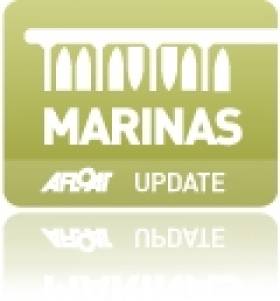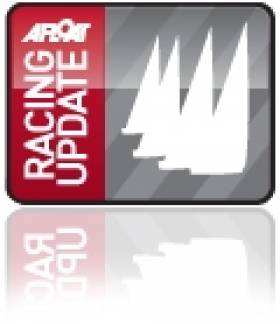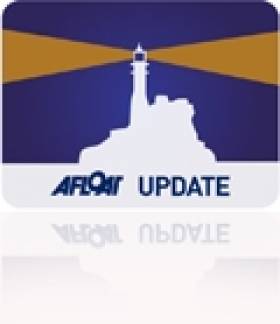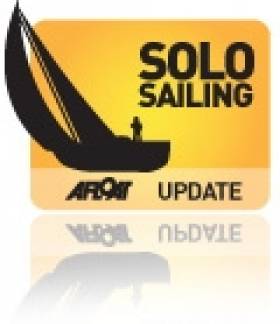Displaying items by tag: Hamble
SB20 Holds Hamble Demo Day at Royal Southern Yacht Club
#sb20 – The UK SB20 class association and distributor SportsBoat World are holding an open day at the Royal Southern Yacht Club in Hamble on Saturday, April 5, 2014, for anyone thinking of sailing an SB20 this year.
SportsBoat World, the worldwide distributor of the hugely popular keelboat, will be demonstrating a brand new SB20, built by White Formula. SB20 owners can also bring their boats along to the Royal Southern Yacht Club for a pre-season check by the expert SportsBoat World team – a great opportunity to check you're in race-winning shape before this summer's packed schedule, which includes championships in Germany, France and Russia.
Sailors interested in crewing on an SB20 for the first time this season can try one of the exciting asymmetric one-designs and meet members of the fleet. There will also be advice on buying new and used boats for prospective owners.
The open day takes place at the Royal Southern YC, on Rope Walk, Hamble, from 1000am to 1600pm. Contact [email protected] to book your slot for a demo sail, or contact [email protected] for a pre-season boat check.
Marina Approval Secured for River Hamble Project
#marina – The Royal Southern Yacht Club and Royal Air Force Yacht Club have been successful in securing Harbour Works Consent, Planning Permission and a Marine Licence for the development of the proposed Prince Philip Yacht Haven on the River Hamble. Specialist consultancy Marina Projects Limited has been the lead consultant throughout an extensive feasibility, design and consultation process that has been undertaken over the last 18 months.
Mark Inkster, Immediate Past Commodore for the Royal Southern, commented, "A great deal of work has gone into every detail of the application process and Marina Projects has provided a truly superb service, and exceeded our expectations at every stage. We have tried in the past to unlock permission for developing our on-water facilities and failed. A recurring theme of the application process was the recognition of the quality, thoroughness and professionalism of the application documentation particularly by the regulatory authorities including Eastleigh Borough Council, the River Hamble Management Committee and Harbour Board. I am in no doubt that without the capabilities of the Marina Projects team and their in-depth knowledge of the consent regime, this success would not have been possible. We are looking forward to continuing our working relationship with them as we proceed to deliver the approved scheme."
The Prince Philip Yacht Haven is another scheme that highlights Marina Projects' ability to secure consents in a highly sensitive and contentious area. Throughout the process Marina Projects used their specialist knowledge and expertise to successfully navigate through the consenting process, responding to national legislation & policy, dealing with local concerns and paying particular attention to site specific conditions. Key elements of the application included production of a consent strategy and a detailed Navigation Risk Assessment that demonstrated how navigational safety was improved by the scheme. A full package of environmental mitigation was agreed with the relevant authorities prior to submission of the applications.
Mike Ward Project Director at Marina Projects Ltd noted "This really is fantastic news for both clubs and underpins the vital contribution that they make to the river and local economy. The partnership approach adopted by the clubs, their desire to deliver a project with a wide range of benefits and a genuine commitment to an extensive consultation process was vitally important to achieving the consent success.
Development of the consented scheme, designed by Marina Projects will include:
· Capital dredging
· Replacement of a failing quay wall structure
· Construction of a full tidal access slipway
· Development of fully serviced walk ashore pontoons
· A purpose built disabled berth complete with personnel hoist - the first on the Hamble
The Prince Philip Yacht Haven will deliver market leading facilities to the combined 2,500 members, disabled and youth sailors, as well as providing improved event hosting capability and additional facilities for the local community. With these key consents now granted, the Royal Southern and RAF Yacht Clubs can move forward with the next step in delivering their new, world-class mooring facility.
J Boats to the Fore on the Hamble
The Hamble Winter Series is one of the most hotly fought off season regatta series in the UK with an entry list that puts it right at the forefront of competitive sailing. There are of course many reasons for this. For starters, it's an extremely well managed event, run by an experienced and inituitive race management team. The courses are varied and challenging, and the racing is tight and competitive. It also enjoys strong sponsor and volunteer support. All in all it's a fabulous series in which to compete at any level, but to win it... well that's really something!
The series prizeging for the Garmin Hamble Winter Series took place on the 10th of December at Hamble River Sailing Club and the Class winners and pdium finishers were all in attendance as one would expect, to collect their prizes. Racing took place across eight classes in the main IRC series including a J/109 one-design class and then there were four additional classes for the J/109s, the J/80s and other sportsboats on the two 'Autumn Championship' weekends. As usual, the J Boat entry list for the series was both strong and sucessful.
In the main IRC series, raced over eight Sundays, David Ballantine's J/133 Jings achieved a creditbale third place overall; a great result to round off his first full year in the boat. Chaz Ivill took the helm of the J/111 Jenga VI and finished second in IRC 1. Ivan Trotman and his J/122 Joulou were placed fourth in the same class. Fourteen J/109s raced as a one-design class on a level rating basis and Richard and Valerie Griffiths veritably romped into the top slot with OutraJeous clocking up just ten points to count across the ten races sailed. David and Mary McGough's Just So slammed in a second place in the J/109s and Paul Griffiths was third with Jagerbomb.The J/97s and J/92s raced in IRC 3 and Mike and Jamie Holmes J/97 Jika Jika won the class convincingly accruing just eight points to count at the end of the series.
The Autumn Championship was a nail-biter for the J/80 Class. Sailed over two weekends in October, Rob Larke's J2X was leading the fleet by a single point after the first weekend, but let things slip on the second weekend. At the end of the fourteen race series, Phil Taylor and Kevin Sproul's J.A.T emerged victorious. J2X settled for second, just three points behind and Thor Askeland took third in Elle S'Appelle. The J/109s also raced at the Autumn Championship and once again it was Outrajeous which emerged victorious. Steven Tapper's Stalker finished in second place and Jody Windmiller's J2Eau took third.
So it was a bunch of very happy J Boat owners at the prize-giving. However, after the series silverware was presented, there were still the two main prizes to be awarded: 'Yacht of the Series' and 'Sportsboat of the Series'. Race Director Jamie Wilkinson explained that these prizes are awarded at the discretion of the race management team to the two boats which in their opinion put in the most impressive performance across all classes. He made the point that the standard of competition at the Garmin Hamble Winter Series is always top-flight and he also reminded the assembled crowd that the sheer number of entries each year means that any single race win is an achievement of which one should be extremely pleased: to actually win 'Yacht of the Series' is a major accolade. Mike and Jamie Holmes scoreline in the J/97 Jika Jika included eight bullets. IRC 3 was considered one of the most competitive classes in the series and Mike, Jamie and the crew of Jika Jika were deserving (and extremely proud winners of the Garmin Hamble Winter Series Yacht of the Series. Phil Taylor and Kevin Sproul never once finished outside the top two in any of the fourteen races they sailed in their J/80 J.A.T. and the class was 22 boats strong! The 'Garmin Hamble Winter Series Sportsboat of the Series' was awarded to Phil, Kevin and the crew on J.A.T.: delighted and proud winners.
Fastnet Yacht Capsizes Off Cork Coast - Latest
A US entrant in this year's Rolex Fastnet Race capsizsed near Fastnet Rock off the Cork coast earlier this evening, The Irish Times reports.
Further to our previous report, The Irish Times notes that 22 people were on board the Rambler 100, which overturned in force-five winds at around 6.30pm this evening.
The Department of Transport confirmed that all crew have been accounted for, with 16 sitting in the hull of the boat and the remainer on life rafts.
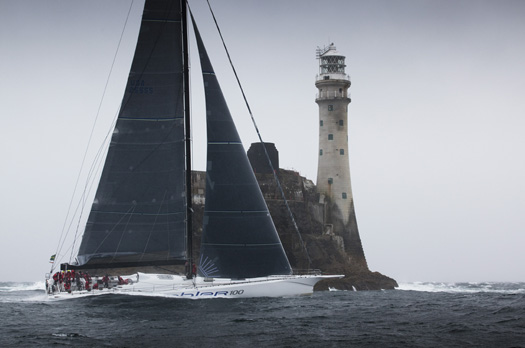
Rambler 100 rounds the Fastnet Rock. Photo: Daniel Forster/Rolex
RNLI Baltimore's lifeboat and the Irish Coast Guard are currently attending. Coastguard helicopters have also been dispatched, with naval vessel LE Clara giving assistance. The rescue effort has been hampered by misty conditions in the area this evening.
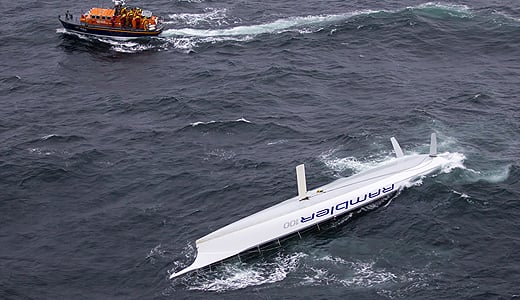
Baltimore lifeboat at the scene of the capsized Rambler 100. Photo: Carlo Borlenghi/Rolex
Rambler 100 recently set a new world record for the almost 3,000-nautical mile transatlantic crossing from Newport, Rhode Island to Lizard Point in Cornwall with a time of 6 days, 22 hours, 8 minutes and 2 seconds.
In other Fastnet action, there was disaster in IRC Z this afternoon for co-skippers Karl Kwok and Jim Swartz’s Farr 80 Beau Geste (HKG).
The yacht suffered a ‘structural problem’ while mid-away across the Celtic Sea en route to the Rock. She has since turned her bow back towards Land’s End.
Yesterday there was another high profile retirement when Johnny Vincent’s TP52 Pace (GBR) returned to her berth in the Hamble with mast problems.
In the Class 40s John Harris’ GryphonSolo2 (USA) has also pulled out, retiring to Dartmouth with sail damage.
- Fastnet
- Cork
- Rolex Fastnet Race
- Lifeboat
- Coastguard
- Irish Coast Guard
- Transatlantic
- Hamble
- Search and Rescue
- Fastnet Rock
- Department of Transport
- world record
- Helicopter
- 2011
- capsize
- TP52
- Land's End
- Rambler 100
- RNLI Baltimore
- IRC Z
- Kark Kwok
- Jim Swart
- Farr 80
- Beau Geste
- Johnny Vincent
- Pace
- John Harris
- GryphonSolo2
- Dartmouth
- Class 40
McConaghy Appoints Ancasta as Ireland Dealer
The initial focus of this new partnership is on the Ker 40; the Jason Ker Designed IRC racer. In addition to the Ker 40, Ancasta will also be promoting the McConaghy 38; an out and out lunatic machine that conforms to no rules and just goes fast upwind and downwind!
The Ker 40 is anticipated as being the next big step in IRC racing. It performs beautifully upwind whilst being exhilarating downwind. This fusion of TP52 inspired performance mixed with an ability to compete under IRC rating is a combination that offers something unique at a price which is very inclusive.
Nick Griffith MD of Ancasta commented: "We are all very excited about the Ker 40, the challenge under IRC has always been to produce a competitive boat under 50' that is also exciting to sail. I have been so impressed with Jason's efforts with the Ker 46 Tonnere and we see the 40 as the next step in that development. At last a full blown 40' race boat competing under IRC. Happy days indeed!"
Ancasta through its extensive network will be handling all the sales and marketing as well as providing the highest standard of after sales care and support. The first two Ker 40's coming to the UK will be based at Hamble Yacht Services in time for this seasons racing.
Solo Sailing Conference Offers Charter of Performance Yachts
Irish solo sailing fans may be interested in the annual Solo Racing Festival at the Royal Southern Yacht Club, Hamble on Saturday 12th March.
Given the Figaro race is coming to Dun Laoghaire in August a talk on the Artemis Academy with John Thorn (Figaro 2) will be of particular interest.
Owen Clarke's designer Merfyn Owen, who lives in Hamble will be attending as well as colleagues from their brokerage partners Boatshed Performance.
So whether your interest be solo sailing or short-handed sailing in general they will be there to answer questions on design, construction, as well as sale/purchase and charter of offshore performance yachts.
The Race Fair is an open house from 10.00 for race organisers to meet and greet potential skippers from; Global Ocean/Class 40, Mocra, UK mini group, RORC, SORC, Biscay Challenge, AZAB. Floating boat show, 8 boats including the OC class 40, 2 minis, A35, J105, Figaro 2, Sunfast 3200.
There is a Book Signing, Alex Bennett signing copies of High Seas High Stakes and showing Fuji DVD Mike Golding is opening the talks at 11,00.
Followed by:
Winning Mind Set with Ian Brown, sports psychologist
Global Ocean race with Oliver Dewar
Two Star/Ostar with John Lewis, RWYC
30m trimaran design with Nigel Irens (Idec, Sodebo)
Artemis Academy first term report with John Thorn (Figaro 2)
Route du Rhum with Marco Nannini, (class 40)
all in the spendid riverside setting of the Royal Southern Yacht Club, Hamble.
More HERE.




























